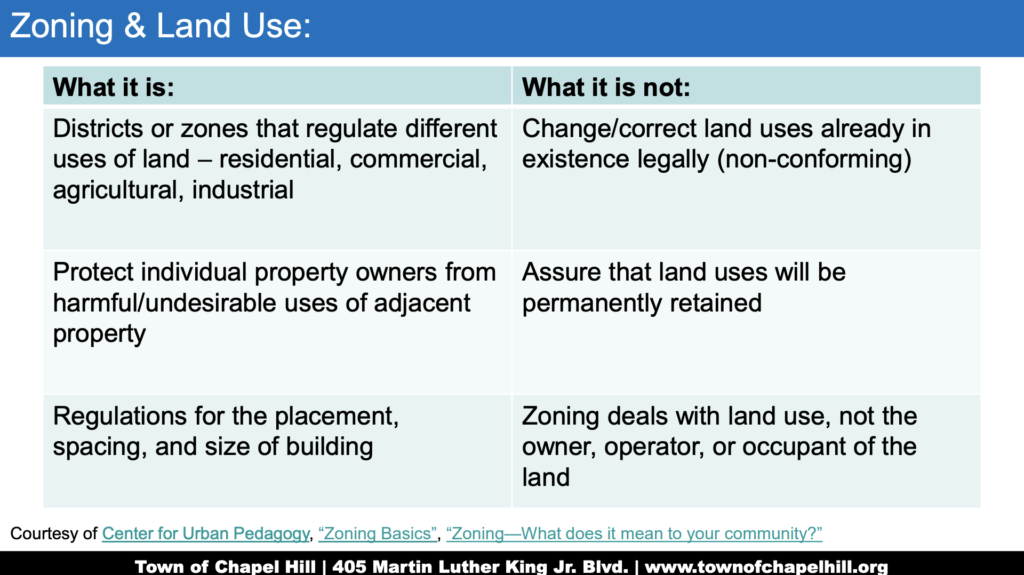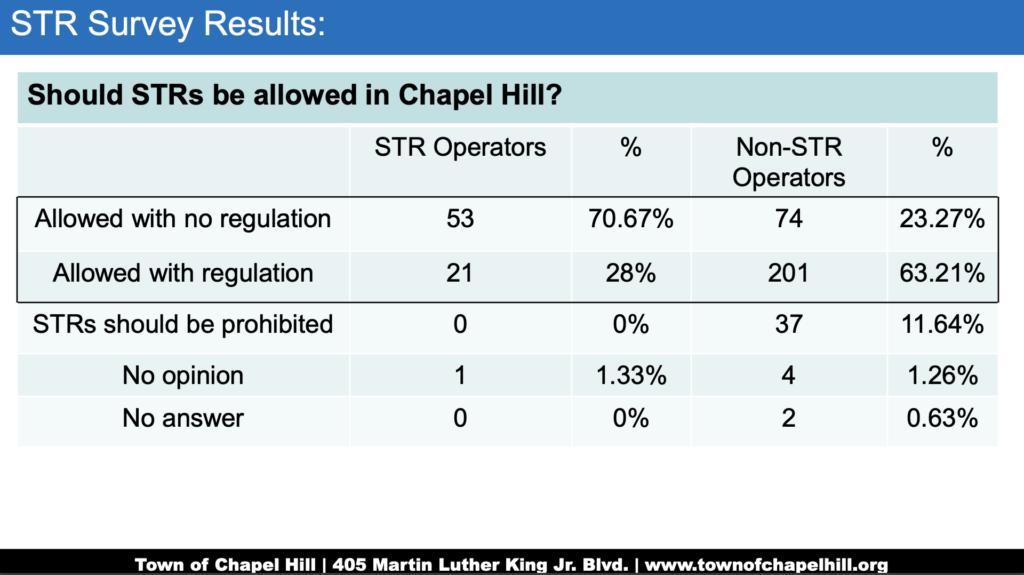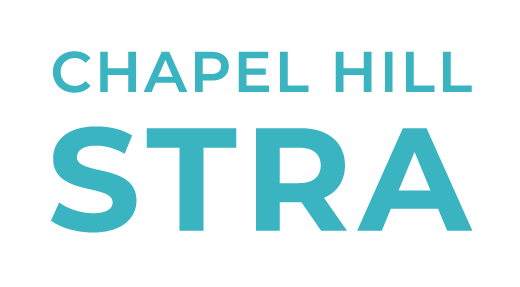On December 11, the Chapel Hill STR task force held its third of four meetings. The group approved the minutes from the second meeting with a minor amendment, available here.
Read our full recap of the STR task force meeting 2 >
Reminder: Per advisory board rules, task force members and members of the public who attend the meetings must abide by non-attribution when reporting on the meetings, meaning we cannot attribute specific comments to specific people. The CHSTRA will uphold this rule. Therefore, the only way for members to get complete insight into meeting discussions with specific comments made is to attend the meetings.
The focus of this meeting was health and safety. Some confusion arose briefly as to whether this discussion applied to all property types or only those under the charge of the task force, which is to focus on non-owner occupied properties. Per discussion in the City Council meeting on September 11, council members stated town staff would develop safety requirements for all STR types which the task force could weigh in on. It is our understanding that the safety topics covered at this task force meeting will likely apply to all property types, but we will seek confirmation of this for the final task force meeting on January 15.
Ahead of this meeting, task force members had reading assignments to prepare for the meeting, which included articles by Rebecca Badgett of the UNC School of Government (who is assisting the town with the STR ordinance creation process), a pros and cons table of different elements of STR ordinances, example safety checklists from other municipalities, and additional materials. The complete reading list can be found here.
Task force members were also assigned a survey on various safety elements of STR ordinances and where respondents think STRs should be allowed or not allowed. Results of the task force survey can be found here.
Planning Department Presentation
The Planning Department made a presentation reviewing the homework assignment and survey results, as well as additional information on zoning as requested in the second task force meeting and detailed results of the Town of Chapel Hill STR Survey.
Highlights from the presentation
A clarification on zoning and land use:

A snapshot of the town STR survey results:

The complete presentation can be viewed here.
Presentation from Rebecca Badgett with the UNC School of Government
Following the Planning Department’s presentation, Rebecca Badgett led a presentation on operational regulations, including an overview of existing health and safety requirements in other towns.
Highlights From This Presentation
Clarification that the early 2019 amendment to the NC Vacation Rental Act (S.L. 2019-73 (HB 483)) that prohibits the permitting or registration of STRs (among other prohibitions) exists in the state’s Minimum Housing Code. As such, towns and cities can still require registration of STRs and impose other rules through their zoning codes and authority.
Authority for local government regulation of STRs:
- Land Use Regulations: Through zoning, local governments may define a land use, set reasonable development standards, and require zoning permits for certain land uses.
- Short-term rentals may be regulated as a land use. All regulation must be tied to zoning powers.
- It is illegal to regulate land ownership. For example, the town could not prohibit nonlocals from buying property to use as a STR in Chapel Hill because they are not a local resident.
Clarification that the safety requirements of the NC Vacation Rental Act apply to short-term rentals for which a rental agreement has been signed by the guest and includes specific language from the act. These safety requirements include:
Landlords’ duty to provide a fit premise:
- Comply with current building and housing codes
- Maintain property/make necessary repairs
- Provide operable some detectors. Place new batters in detectors annually or when tenant provides notice that replacement is necessary
- Provided a minimum of one operable carbon monoxide detector. Must be a certain type of detector. Check detector every 6 months.
Tenants’ duty to maintain dwelling unit:
- Keep property clean and safe
- Dispose of garbage, ashes, rubbish, and other waste in a safe manner
- Do not destroy or deface a smoke detector
- Comply with all obligations imposed by the building and housing codes
- Notify landlord of the need for replacement of or repairs to a smoke detector
Editor’s Note: While the safety requirements of the NC Vacation Rental Act do not apply to most reservations in Chapel Hill, they mirror the safety requirements outlined in the landlord-tenant laws of the NC General Statutes for long-term rentals. The CHSTRA believes any town STR ordinance safety requirements should generally follow the same requirements of long-term rentals.
Ms. Badgett’s complete presentation can be viewed here.
Comments from the Town of Chapel Hill Office of Community Safety
Tom DiBenedetto from the town of Chapel Hill Office of Community Safety attended the meeting to clarify current property safety codes. He shared that short-term rentals that are a single piece of deeded property with two or fewer dwelling units (including single-family homes, duplexes, and single-family homes with an ADU) fall under residential safety codes. Apartments and condos fall under a residential occupancy within a commercial building (fire marshalls will inspect common areas but not individual units). These codes are created by the International Code Council (ICC) and individual states can make amendments. A read-only view of NC’s residential code can be found here.
Group Discussion
Following these presentations, the task force discussed five key health and safety elements: occupancy caps, proof of insurance, signage, safety inspections, and designated responsible parties.
Occupancy Caps: The group exhibited general consensus that some limit to the number of occupants in a property at a single time was acceptable. About half of the group was in favor of a limit of 2 per bedroom plus 4 additional occupants. Others favored a limit of 1 person per 200 square feet. Others did not express a preference at this meeting.
Proof of Insurance: Most group members agreed that the town should not require proof of STR insurance (due to the burden and liability this would put on the town) and instead agreed that STR operators should be required to sign some acknowledgment that they have proper STR insurance when registering. At least one task force member opposed this option.
Signage: On whether STR operators should be allowed to post a sign for their STR, all task force members except one agreed that this should not be allowed. The group unanimously agreed that address numbers should be clearly visible from the street.
Safety Inspections: Task force members were presented with multiple options for requiring safety inspections:
- Safety inspections by town staff by complaint only (currently in effect)
- Requiring operators to complete a self-inspection checklist prior to registration
- Requiring an initial inspection by town staff prior to receiving an STR permit
- Requiring an initial inspection by town staff prior to receiving an STR permit and periodic inspections every certain number of years
Responses to these options were mixed, and several members requested to know first what the safety requirements and checklist would entail before knowing which option they would support.
Designated Responsible Party: Much of the task force agreed that STR operators should be required to designate a responsible contact who resides a certain distance away and can be on call to respond to issues at the property within a certain time limit. Some agreed that this would be beneficial for all STR types, including homeshares and primary residence whole-home rentals, for the times where the host or owner may not be on site.
What’s Next
The fourth and final task force meeting will take place on January 15 at the Chapel Hill Public Library in meeting room A from 4:30 – 6:30 p.m.
The agenda for this meeting is tentatively set to revisit safety topics and formalize a complete list of recommendations to share with the City Council.
Member Action Items
CHSTRA Members: This is your last opportunity to voice your thoughts to the task force before its recommendations are finalized and submitted to town staff and council. Don’t let it go to waste. Attend the meeting and voice your support of STRs during the public comment period. If you cannot attend, email your thoughts to Anya Grahn at agrahn@townofchapelhill.org. She distributes these to the task force ahead of each meeting.
CHSTRA members are also encouraged to submit general questions and helpful information that may be used in task force discussions. You may also send these to agrahn@townofchapelhill.org.

